Microsoft ends support for Internet Explorer on June 16, 2022.
We recommend using one of the browsers listed below.
- Microsoft Edge(Latest version)
- Mozilla Firefox(Latest version)
- Google Chrome(Latest version)
- Apple Safari(Latest version)
Please contact your browser provider for download and installation instructions.
Society
Respect for Human Rights
Policies and Concepts
NTT is committed to respecting global human rights and believes it is an important corporate social responsibility. The NTT Group will strive to correctly understand and recognize each country and region's laws, cultures, religions, and values. We aim to create a safe, secure, prosperous and sustainable society by fulfilling this responsibility.
As a company operating globally, we disclose the global human rights policies of the NTT Group both internally and externally, in addition to meeting the requirements of international laws and evaluation organizations.
This policy applies to all employees and officers of the NTT Group. We also ask our suppliers and business partners to support this policy and strive to respect human rights.
Establishment of the NTT Group Global Human Rights Policy
In its goal of achieving a sustainable world, the NTT Group is shining a spotlight on various human rights themes that exist in various countries and regions, and is highlighting its attitude toward human rights issues in value chains. To this end, we included parts of NTT Group's existing Human Rights Charter in the new NTT Group Sustainability Charter, and established the NTT Group Global Human Rights Policy in November 2021, based on principles like the International Bill of Human Rights (Universal Declaration of Human Rights and International Covenants on Human Rights), Declaration of Fundamental Principles and Rights at Work, and UN Guiding Principles of Business and Human Rights.
Accordingly, an internal due diligence manual was established to ensure that effective due diligence can be conducted as part of efforts to promote respect for human rights.
This human rights policy applies to all people involved in the NTT Group value chain.
The NTT Group is committed to respecting human rights throughout its business operations by proactively working with and engaging in constant dialogue with all of its partners and stakeholders, including customers, shareholders, investors, employees, local communities, business partners, other companies and industry organizations, national and local government agencies, and NGOs, NPOs, and experts. We will comply with human rights respectfully throughout our business activities while listening to and responding to changes taking place in society.
To ensure that the NTT Group is not complicit in infringing human rights moving forward, we will continue to engage with stakeholders and staff in charge of human rights overseas every year, and we are always revising the human rights policy so that we can respond in the appropriate manner.
NTT Group Global Human Rights Policy Preamble
NTT is committed to respecting global human rights and believes it is an important corporate social responsibility. The NTT Group will strive to correctly understand and recognize each country and region's laws, cultures, religions, and values. We aim to create a safe, secure, prosperous and sustainable society by fulfilling this responsibility.
To this end, we will respect the Universal Declaration of Human Rights and other internationally recognized human rights in all our corporate activities. We will strive to ensure that we are not directly or indirectly involved in discrimination or other human rights violations.
We respond appropriately when negative impacts on human rights occur.
When negative impacts on human rights are done by a business partner and are linked to a product or service of the NTT Group, we also expect them to respect human rights and not to infringe on them.
To fulfill this responsibility, senior management will take the initiative to respect all stakeholders' human rights. We will review and improve business operations and other aspects as necessary from the perspective of respecting human rights and reflect this in our business activities to establish a corporate structure that respects human rights.
Addressing critically important human rights issues
Given the progress of globalization, the advancement of information technology, and the increasing complexity and diversity of social structures in recent years, we at the NTT Group believe that there is a need to consider human rights from new perspectives, and that awareness among people of the importance of respecting human rights is growing.
Amid these conditions, as a global technology company, the NTT Group is committed to the following:
- Promotion of "Diversity & Inclusion," in which diverse cultures and values are mutually recognized
- Promotion of "Technology that is based on high ethical standards," which balances both high ethical standards and technology
- Promotion of "Healthy work in daily life"
- Promotion of "Appropriate expression, speech, and display" in consideration of human rights
Going forward, we will identify particularly important human rights that deserve special focus, and take action to ensure that they are respected.
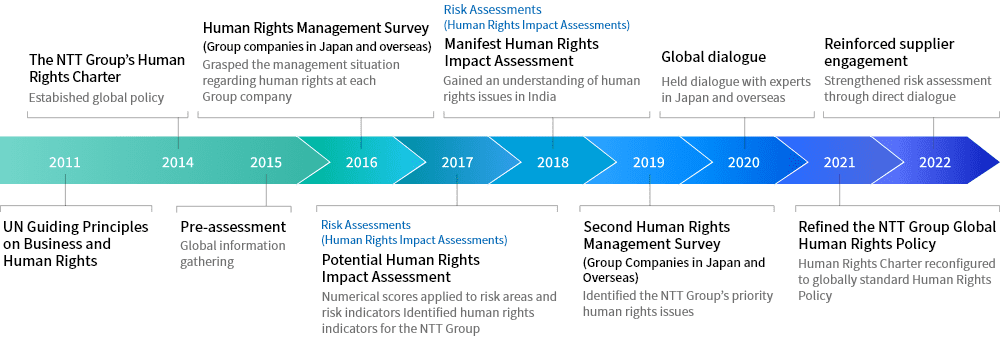
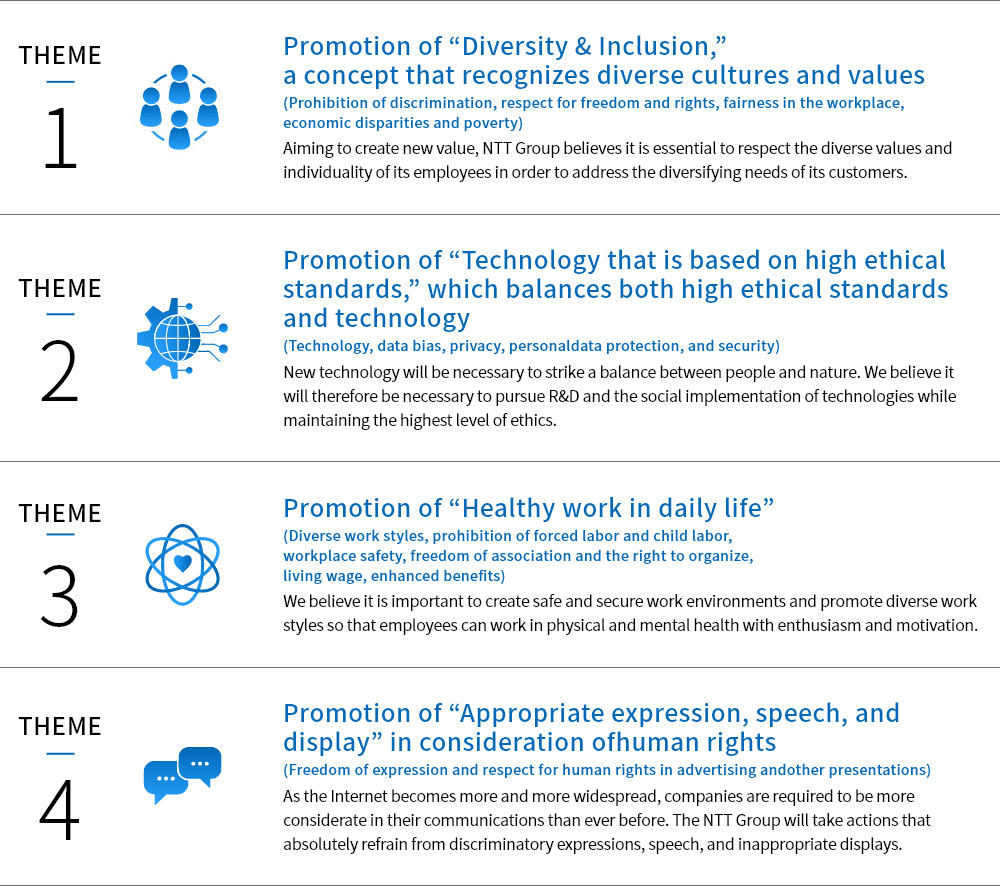
Initiatives Relating to Human Rights Due Diligence
We make improvements aimed at stopping, preventing or reducing any negative effects related to human rights.
We also establish common global targets for human rights issues to be addressed and promote their adoption with the NTT Group business operations.
We continued to hold dialogue with group companies in Japan through fiscal 2021, and after reassessing the situation, established globally standard targets for the way our management needs to be enhanced.
We also created internal guidelines for human rights due diligence, which serve to foster a common understanding as well as outline the appropriate procedures to take.
In fiscal 2023, zero cases of human rights infringement were observed.
The NTT Group vows to address any human rights infringements or potential infringements and resolve the issues by taking appropriate steps through a speedy and accurate fact finding process, and responding in a timely, suitable, and transparent manner in order to fulfill its social accountability.
In fiscal 2023, as part of human rights due diligence, identification of risks within the business was conducted for all value chains (internal and supplier) based on the human rights policy established at some NTT Group companies in fiscal 2022.
Four material issues (D&I, Technology that is based on high ethical standards, Healthy work in daily life, and Appropriate expression, speech, and display) outlined in the Human Rights Policy were reviewed with risk mapping.
We have also begun to closely assess minimum risk aversion content to avoid damage to the Group's reputation when making new investments.
Specifically, a checklist is used to confirm that we are addressing situations where negative impacts on human rights are anticipated.
The specific human rights due diligence process implemented in fiscal 2023 is as follows:
- Screening of investigation subjects (selection of companies based on scale from among overseas headquarters, major domestic and international group companies, and overseas group companies located in high-risk countries)
- Implementation and analysis of SAQs (SAQs are sent out, and the number and nature of reports from each company are analyzed as input information)
- Risk map creation (developing risk maps showing risk reduction response/impact severity versus likelihood of occurrence)
- Consideration and implementation of corrective measures for high-risk items (consideration of measures to reduce the risk of items determined to be high-risk)
- Direct dialogue (discussion with companies as part of considering and implementing risk reduction measures)
- Disclosure (disclosure of human rights due diligence results in sustainability reports, etc.)
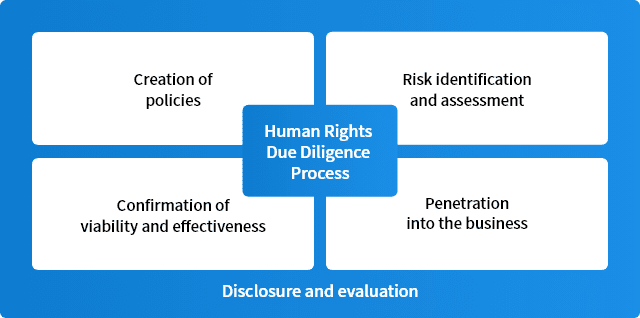
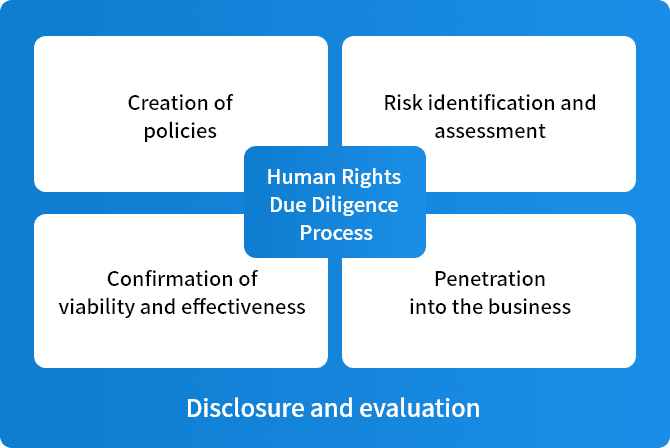
Preventing Harassment
We are aiming to create a workplace environment in which each and every employee is able to perform to the best of their ability. Instances of harassment at the workplace are viewed as issues related to human rights, and acts that harm the personality or dignity of individual workers are socially unacceptable. Such acts also result in deteriorating workplace relations and adversely affect job performance, and we recognize this as a major issue. In light of this, the NTT Group Global Human Rights Policy was revised in 2021.
The NTT Group is striving to develop a corporate culture where acts of harassment are not allowed to happen and are unacceptable. While various measures have already been put in place, the types and methods of harassment have become increasingly varied in recent years. We will continue to develop a broad range of initiatives regularly toward achieving a goal of eliminating harassment.
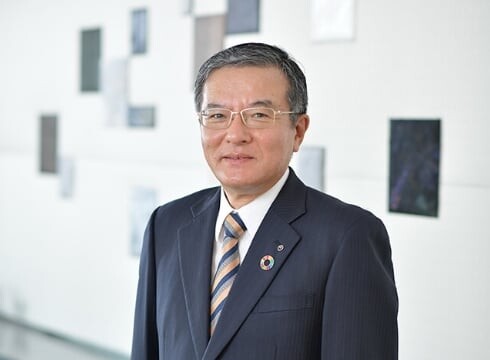
More specifically, all employees will be provided with ongoing training in order to increase awareness for eliminating harassment. We will constantly seek to enhance employees' understanding and knowledge of harassment, and provide ways to learn how to respond to harassment.
We will also be taking other measures such as setting up contact points both within the company and externally, revising employment rules to cover the diversifying ranges of harassment, and increasing penalties for those found to be involved in harassment.
We will continue our efforts toward creating a safe and comfortable workplace free of harassment where all employees respect one another, to ensure that each and every person at the NTT Group is able to work in an energetic manner with mutual respect.
Representative Member of the Board
President
CEO

Organization for Implementation
NTT is committed to supporting its Group companies in their efforts to raise awareness on human rights issues. We believe it is important for the entire NTT Group around the world to instill an understanding of respect for human rights and undertake business activities with a full awareness of human rights. Accordingly, NTT has established the Human Rights Committee, headed by a senior executive vice president, under the Executive Officers Meeting.
Through this framework, we are working to heighten human rights awareness across the NTT Group and reinforce human rights management, including conducting human rights due diligence, training on human rights issues (training for officers including those at Group companies, training for all employees, etc.), and establishing and operating contact points for human rights.
Targets and Performance
(13) Confirmed human rights infringements
Fiscal 2024 target: 0 cases (NTT Group-wide)
(14) Rate of direct dialogue with suppliers who require improvement requests [human rights]
Please see the following page:
Main Initiatives
Penetration into the business
We make improvements aimed at stopping, preventing or reducing any negative effects related to human rights.
We also establish common global targets for human rights issues to be addressed and promote their adoption with the NTT Group business operations.
Group-wide Human Rights Training and Education Programs
To ensure awareness of the need to respect human rights and educate employee on expected global standards at key points in employees' careers (joining the Company, receiving promotions, etc.), we provide training on human rights issues connected to business activities. In addition, for those in the top management positions of Group companies or in other management positions, we offer programs that include lectures by outside experts on global issues in human rights.
To foster awareness of human rights among employees, we issue invitations to employees and their families to submit human rights slogans, while the Board member responsible for human rights issues delivers a message to mark Global Human Rights Day.
Since fiscal 2014, the NTT Group has worked to disseminate its Human Rights Policy by continuously carrying out educational activities during training for all employees as well as on other occasions.
During the training, we communicate the importance of respect for human rights and the significance of addressing the issue within the NTT Group.
Promotion of "Diversity & Inclusion"
"D&I Statement"
The NTT Group has established the D&I Statement as a means of promoting Diversity Equity & Inclusion.
We will be promoting D&I in line with this statement.
Promotion of "Appropriate expression, speech, and display" in consideration of human rights
As the Internet becomes more and more widespread, the negative impact of harmful websites and slanderous content on social media targeting on young people is becoming a societal problem.
One aspect of communications technology like social media is that it leads to platforms created solely based on individual's preferences or sense of values.
In this context, companies are required to be more considered in their communications than ever before.
The General Manager of the Sustainability Promotion Office concurrently serves as the Chief Privacy Officer (CPO) and acts as a contact point for complaints of privacy violations in the company.
Specific Initiatives
DOCOMO gives careful consideration to protecting the freedom of expression and privacy rights of people communicating via the Internet, social media and digital communication devices, which are ICT industry specific issues that have been gaining more recognition by most telecommunications carriers in Europe and the U.S.
With reference to the Principles of Freedom of Expression and Privacy established in 2013 by the Global Network Initiative, a global network of telecommunications companies, we take a stance to fulfill our own responsibility to respect and protect the freedom of expression and privacy of our users. This includes protecting the globally recognized rights of our users, even in situations where we need to provide customer information under special circumstances, such as a matter of national security requested by the government.
Contact Point for Human Rights Issues
At the NTT Group, contact points have been established that offer consultation with specialist counselors regarding harassment and other employee human rights issues.
Besides establishing specialist contact points for reporting and consultation, we are also taking action to construct environments where diverse employees can receive consultation on their concerns amid conditions that inspire them to work together while acknowledging each other's diversity.
Specifically, we are training managers on considerations for managing diverse employees, creating an environment conducive to seeking consultation, and methods of responding when approached for consultation.
Basic Policy on Customer Harassment
The NTT Group has established the Basic Policy on Customer Harassment based on the philosophy that protecting individual employees from customer harassment to create a safe and comfortable work environment will lead to providing high-quality services focused on customer experience (CX).
Risk identification and assessment
At the NTT Group, human rights managers from domestic and overseas companies discuss and select human rights issues to be addressed by NTT and determine priority issues to be addressed each year.
We will also hold dialogue with experts to obtain advice regarding our initiatives.
In our human rights management survey in fiscal 2016 covering all Group companies in Japan and overseas, and based on the Guiding Principles on Business and Human Rights, we checked up on their human rights policy, management systems and priority human rights issues.
The results identified priority human rights issues for 250 of the 258 companies surveyed and indicated that 248 companies are working on specific initiatives to raise awareness about these human rights issues.
Since fiscal 2017, we have brought in external specialized institutions to implement risk assessments based on results obtained from in-house surveys.
In fiscal 2017, a potential human rights impact assessment was carried out which assigned an evaluative score to the degree of negative impact of the NTT Group's businesses on the human rights of stakeholders from the perspective of "the likelihood of future human rights risks in each country" and "severity of human rights risks arising in each business."
The results of this led to us identifying Asia as a priority area for tackling human rights issues and establishing 21 human rights indicators for ICT business.
In fiscal 2018, a manifest human rights impact assessment was carried out to verify the initiatives implemented in the previous fiscal year. After considering factors such as country risk for each country in Asia and impact on business, India was selected as the country to be assessed. Interviews were conducted with our local subsidiary and a local NGO that deals with human rights risk associated with specific business activities. The results of this confirmed there are currently no serious human rights issues that present a major risk to business operations. Meanwhile we identified priority issues out of the 21 human rights indicators that should be addressed in India in the future.
In fiscal 2019, we conducted a second human rights management survey following the first one in fiscal 2016 to confirm the management status of human rights contact points at each company and to set the NTT Group's human rights priorities. The survey was conducted targeting the NTT Group and our supply chain.
As a result, we identified "women's rights," "privacy rights," "working hours," "occupational health and safety," and "the right to organize and collective bargaining" as our top five issues and became aware of the urgent need to reconfigure management to address global human rights issues. We also held a stakeholder dialogue involving five experts from three overseas organizations (Verisk Maplecroft, World Benchmarking Alliance, and Corporate Human Rights Benchmark) and one Japanese organization (Japan Research Institute) with the head of the Human Rights Office. In this dialogue, we received advice on the NTT Group's overall human rights initiatives, human rights in the ICT industry, related challenges, information disclosure and Groupwide promotion of initiatives.
In fiscal 2020, we held an in-house lecture for each issue with external experts from the organization, BSR. We held these lectures with the aim of fostering an understanding of the priority human rights issues we face as a united NTT Group company, including our global operations, and we also considered the reporting efforts of each company within the group. This dialog was conducted several times.
We also researched the human rights management content required of us as a global ICT company, and worked with staff in charge of human rights including at global group companies to focus on particularly important issues and select four themes.
In fiscal 2021, we will continued to hold dialogues with each company in Japan and overseas to determine specific courses of action, and also establish a global standard for human rights policy.
The entire Group also focused efforts on holding direct dialogue with 40 important suppliers in particular.
In addition to risk assessments conducted through direct dialogue, we recognized the need to cooperate with suppliers to implement corrective measures.
From fiscal 2022, further efforts will be made to increase supplier engagement, with steps like becoming a member of JAC (Joint Alliance for CSR) and utilizing external audits like Eco Vadis.
Penetration into the business
To confirm the viability and effectiveness of the measures and check progress, performance targets (KPI) have been set and will be followed up.
This process will be held regularly, with sustainability liaison meetings held to check progress of viability and effectiveness.
Disclosure and evaluation
The Sustainability Committee and global conferences are held once a year to share progress and results around the world.
The details of due diligence are disclosed externally in the Integrated Report and other publications, along with reports of activities.
The NTT Group also endeavors to broadly communicate its "Business and Human Rights" initiatives.
In fiscal 2019, we shared an overview of the business and human rights activities of the NTT Group at an international conference hosted by the Caux Round Table Japan. We also reported on the results of human rights due diligence and risk assessment conducted from 2017 to 2018 as well as on how these processes are being applied across Group companies. Moreover, we expressed our intention to continue assessing risks, bolster educational programs on business and human rights, and establish an effective management system. The conference was attended by 97 people from 54 companies and 8 organizations, including companies, NGOs, NPOs, and universities.
Dialogue with third parties
In each process, when risks are discovered, we hold dialogues with experts and other third parties and work with everyone in the value chain to make improvements to finding a broad and fair solution.
Even now, we seek advice from outside experts and other specialists to discuss our Human Rights Policy and measures related to human rights.
Creation of Human Rights Risk Maps
In fiscal 2023, as part of initiatives by certain NTT Group companies, we created a human rights risk map based on responses to a self-assessment questionnaire (SAQ) consisting of risk and vulnerability assessments, which was conducted at major domestic and international group companies, and overseas group companies located in high-risk countries.
The priority risks identified were "occupational safety and health, and an appropriate work environment," "harassment," and "accessibility issues such as the digital divide."
In fiscal 2024, we will identify the detailed situations through discussion with the organizations where issues were identified, and continue to promote risk reduction measures such as establishing systems and implementing best practices from the Group.
At the same time, based on discussions with human rights officers in Japan and overseas, we will begin to formulate a human rights due diligence policy and guidelines, clarify the Group's direction and standards, and apply them to implement corrective actions.
Going forward, we will work to improve human rights due diligence and enrich discussions on human rights in business through efforts such as joining BSR, the UN Global Compact, and other external groups to actively engage in dialogue.
Other Human Rights Initiatives
Introduction of B-BBEE
South Africa, where NTT DATA, Inc (formerly Dimension Data) has a location, adopts the Broad-Based Black Economic Empowerment (B-BBEE) policy to enhance the status of people who had been disadvantaged by discriminatory treatment during the apartheid era.
Under B-BBEE, which the Government of South Africa uses as an assessment standard, companies are rated on a scorecard for their level of contribution to ownership, management, employment equity, skills development, preferential procurement, enterprise development, and socio-economic development.
As a result of its efforts in the areas of ownership, employment equity, and skills development, it was recognized as a Level 2 contributor, the second highest recognition in the eight level system.
Assessment of Risks Associated with Conflict Minerals
In accordance with the NTT Group's Approach to Conflict Minerals, we conducted written surveys and inspected the offices and factories of suppliers to determine whether or not these minerals are used in their products.
Modern Slavery Act Statement
NTT Group companies have published their statements in accordance with Article 54, Item 1 of the Modern Slavery Act 2015 enacted in the United Kingdom.
With the "Modern Slavery Statement," companies set out their actions to ensure that slavery and human trafficking are not taking place in their business operations or in their supply chain.
Society
NTT STORY
WEB media that thinks about the future with NTT










